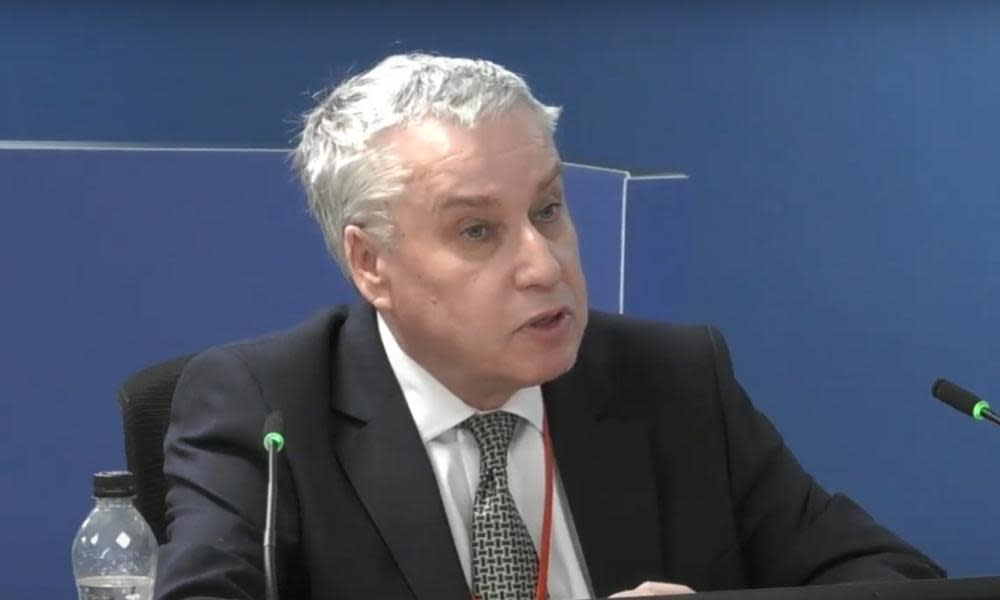Grenfell surveyor had to handle 130 projects at once, inquiry hears

The council department responsible for checking the safety of the Grenfell Tower refurbishment was “swamped” with work as austerity-driven cuts slashed staff numbers and the key surveyor was left handling 130 projects at once, the public inquiry in the disaster has heard.
John Hoban, senior building control surveyor at the Royal Borough of Kensington and Chelsea, said councillors had signed off substantial cuts to the building control department piling work on the remaining staff.
(June 14, 2017)
The fire breaks out in the early hours of the morning, prompting a huge response from emergency services, who are unable to bring the fire under control or prevent a severe loss of life.
(June 15, 2017)
The then Conservative prime minister, Theresa May, visits the scene and orders a full inquiry into the disaster, and the government promises that every family will be rehoused locally.
(June 16, 2017)
The communities secretary, Sajid Javid, orders an emergency fire safety review of 4,000 tower blocks across Britain, and it will emerge that 120 tower blocks have combustible cladding. Scotland Yard launches a criminal investigation into the Grenfell fire.
(June 18, 2017)
The chancellor, Philip Hammond, says the cladding used on Grenfell Tower was banned in the UK.
(June 29, 2017)
The retired judge Sir Martin Moore-Bick is appointed to lead the public inquiry. Kensington and Chelsea council’s first meeting since the disaster is abandoned after the council fails in a bid to ban the media from attending.
(July 4, 2017)
Survivors have their first official meeting with the police and coroner.
(September 14, 2017)
The inquiry formally opens.
(November 16, 2017)
As the final death toll is confirmed to be 71 people, it is revealed that hundreds of households are still living in hotels.
(September 27, 2018)
In defensive testimony at the inquiry, London fire brigade commissioner Dany Cotton said she would not change anything about the way the brigade responded to the Grenfell disaster, provoking anger from both survivors and the bereaved.
(March 7, 2019)
Grenfell survivors and the bereaved expressed frustration at Scotland Yard after they admitted no charges were likely until 2021.
(October 28, 2019)
The public inquiry report concludes that fewer people would have died had the fire brigade been better prepared.
(November 5, 2019)
Leader of the House of Commons Jacob Rees-Mogg is forced to apologise after stating that victims of Grenfell did not use "common sense" and leave the burning building.
(November 27, 2019)
Grenfell cladding firm Arconic reveals it has spent £30 million on lawyers and advisors defending their role in the disaster.
(January 27, 2020)
The second phase of the Grenfell Tower inquiry begins.
Stacee Smith and Grace Mainwaring
Hoban, the first person from Conservative-led council to give evidence in public about the fire that claimed 72 lives, said he was forced to take on work from three other colleagues as well as his own as the refurbishment was under way between 2014 and 2016.
He was assigned Grenfell Tower, which was previously handled by a more senior officer, even though he had never worked before on the overcladding of a highrise block.
He resigned before the fire because, he told the inquiry: “I had had enough.”
“I wasn’t able to do the job I was trained to do,” he said.
The inquiry has already heard evidence from the council-owned tenant management organisation, the architect, main contractor and cladding contractor that they relied on the council’s building control department to ensure the refurbishment complied with the building regulations.
But Hoban said he did not realise they thought that and admitted he did not know about a series of fire risks presented by what they designed and built.
The tower was owned by Hoban’s employer, RBKC, but he said “we wouldn’t give them any favourable consideration”.
Richard Millett QC, counsel to the inquiry, asked Hoban about his knowledge of key building regulation documents and what they said about fire risks in cladding systems.
He repeatedly said he had not considered their lessons, said he received no training in technical industry guidance and said that reading professional magazines was considered as continuing professional development.
Hoban had not read a document about the fire performance of external thermal insulation for walls of multi-storey buildings known as BR135. It detailed a 1999 cladding fire in Garnock Court in Irvine, Scotland, and explained with pictures rapid fire spread through cladding.
“Did you understand at the time … that cladding systems can create the opportunity for rapid unseen flame spread causing an unacceptable risk to the occupants?” asked Millett.
“It wasn’t in the forefront of my thoughts,” Hoban replied.
Asked if he was aware of the guidance differentiating between non-combustible panels made from materials such as cement and combustible panels, including aluminium panels which may melt and create molten debris, Hoban said: “Not at the time”.
BR135 detailed “conflicting requirements” between materials that were more energy efficient but which “increased the volume of potentially combustible materials being used in cladding applications”.
“It’s not something I considered at the time,” Hoban said.
The document said composite panels had good performance for resisting the surface spread of flame, but once they become involved in a fire “they have the potential to generate falling debris, add to the overall fire load and provide a route to propagate the fire up the outside of the building”.
Again, Hoban said that was not a principle he was aware of this at the time.
Hoban was asked about notes he filed to RBKC’s computerised records management system, known as Acolaid, which the inquiry heard were now missing.
He said he made handwritten notes and handwritten project sheets and remembered putting all his notes into the system, including coming in at the weekend to do so.
The inquiry continues.


